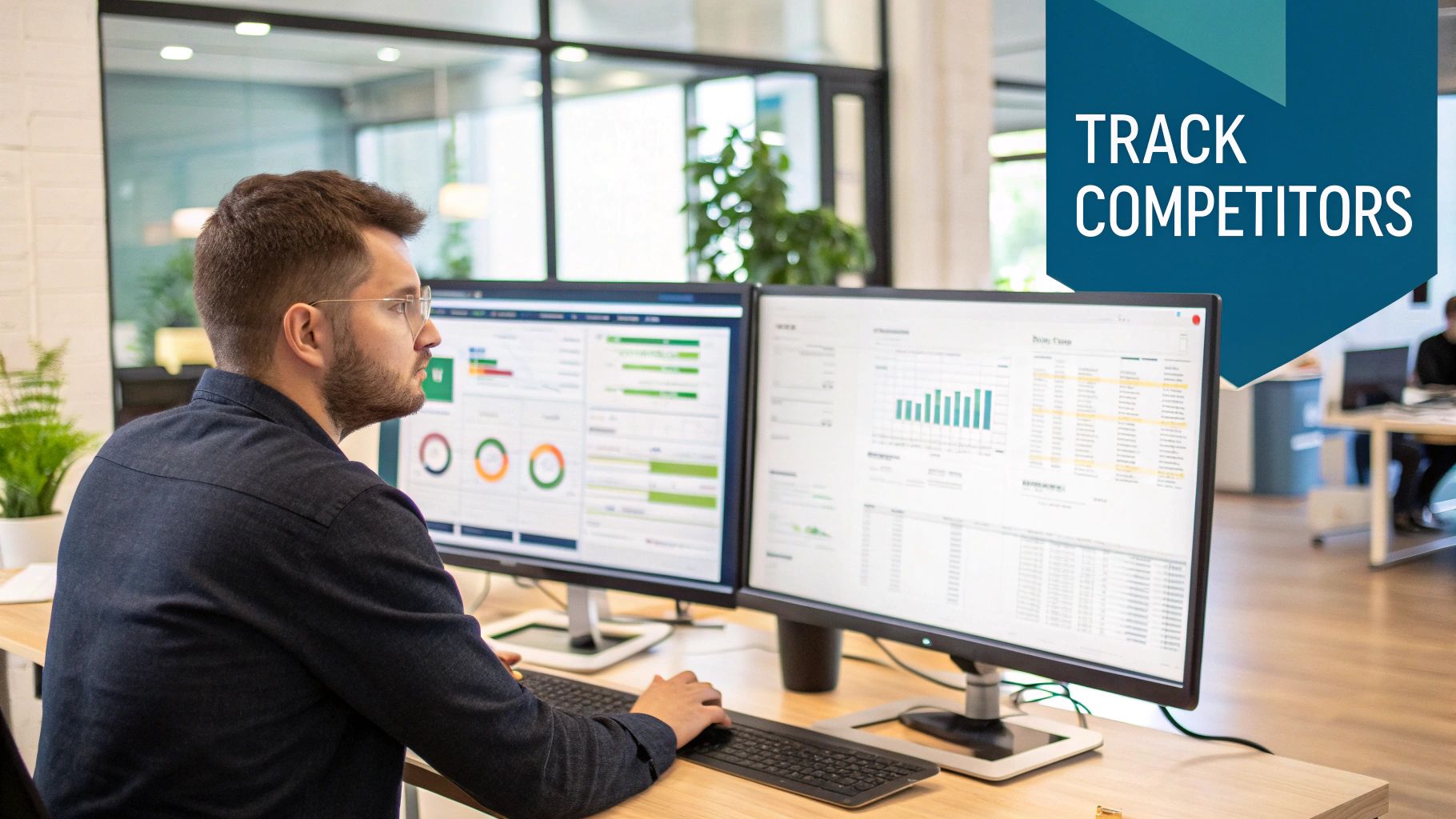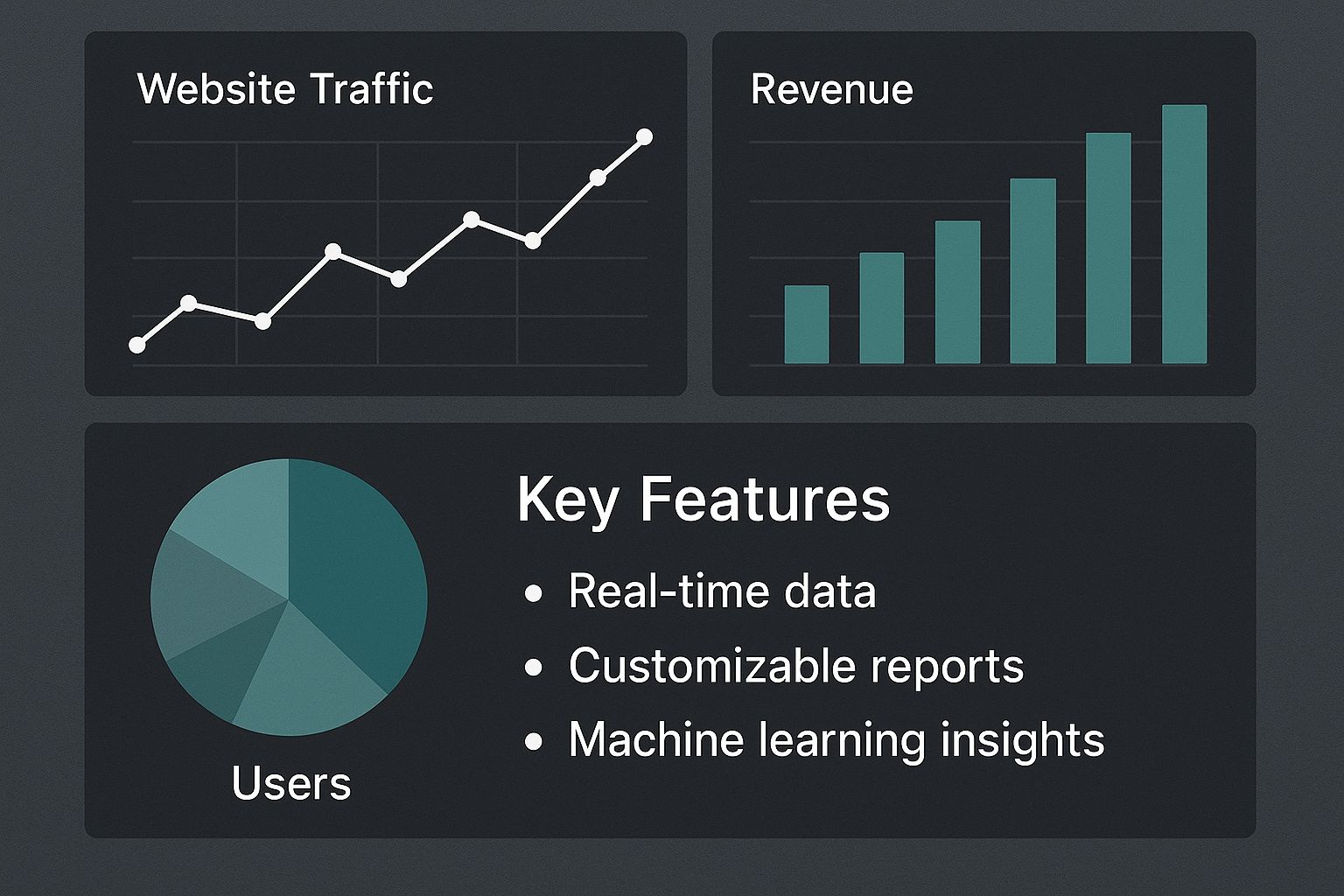
As a founder, you're either tracking your competitors or you're flying blind. Competitor tracking software isn't another nice-to-have for your stack; it's mission control. Think of it less as a spy tool and more as a way to learn from the market in real-time so you can adapt, innovate, and win.
Stop Flying Blind and Start Tracking Competitors

Running a business without watching the competition is like navigating a maze blindfolded. You might get there, but you'll waste time, hit dead ends, and get beaten by someone who can see the board.
We learned this the hard way at BillyBuzz. Early on, we spent months agonizing over a new feature. While we were stuck in deliberation, a direct competitor launched the exact same thing. It was a wake-up call. We were so focused on our own build that we missed what was happening right outside our door.
The Real Cost of Ignorance
That misstep cost us first-mover advantage and put us on the back foot, reacting instead of leading. That experience drove home a core belief: market awareness isn't optional.
The price of being oblivious is steep:
- Missed Opportunities: You miss emerging trends your competitors are already monetizing.
- Wasted Resources: You pour time and money into features the market has moved beyond.
- Reactive Strategy: Your roadmap becomes a response to others, keeping you a step behind.
- Vulnerability to Disruption: A new player slides in with a better solution, and you don't see them coming.
From Guesswork to Guided Action
This is where competitor tracking software comes in. It helps you shift from gut feelings to data-driven action. It’s not about copying rivals; it’s about gathering intelligence to make smarter, faster decisions.
For us, putting a formal tracking process in place was the turning point. We started spotting patterns, anticipating market shifts, and finding angles our competitors had totally missed.
This guide is our playbook. I'm skipping the theory and sharing the practical, no-fluff approach we built at BillyBuzz to turn competitive data into a real advantage. For a deeper dive into the fundamentals, check out our ultimate guide to competitor analysis for emerging businesses.
How Competitor Tracking Software Actually Works
So, what’s really going on under the hood?
Think of competitor tracking software as a small, dedicated intel team that works 24/7. Instead of you spending hours manually checking ten different websites and social feeds, the software automates the collection of publicly available information. It’s your mission control dashboard for every move your rivals make.
This isn’t a niche tactic anymore. The market for competitor analysis tools was already worth $4.32 billion in 2021 and is on track to hit $6.60 billion by 2025. That boom tells you how much businesses now rely on these tools. You can dig into the numbers in this competitor analysis evaluation market growth report.
Essentially, the software uses effective data scraping techniques to pull data from websites, social platforms, and search engines, creating a constant feed of intelligence.
Step 1: Monitoring What They Do Right Now
The first job of any tool is to monitor. You tell the software who to watch, and it keeps a constant eye on their digital activity.
Here at BillyBuzz, we don’t just track broad mentions. We configure our tools to watch for specific actions that signal a strategic move.
- Website Changes: Did they launch a new landing page? Tweak pricing? Change a headline?
- Content and SEO: We get a heads-up when they publish a new article, rank for a valuable keyword, or earn a new backlink.
- Social Media Activity: We watch their ad campaigns, engagement rates, and post frequency.
- Product Updates: We keep tabs on their changelogs, help docs, and press releases.
This ongoing surveillance builds a live feed of their day-to-day tactics.
Step 2: Analyzing What Their Activity Means
Next is analysis. A long list of competitor activities is just noise. The real value is when the software helps you connect the dots and reveal patterns.
For instance, if a rival suddenly publishes ten blog posts about "AI for small businesses," the tool flags it as a significant trend. It's not a one-off article; it’s a clear signal they're making a calculated push to own that topic.
This is what separates simple data from true intelligence. The analysis layer helps you shift from asking, "What did they just do?" to "Why did they do it, and what does it mean for us?"
Step 3: Alerting You to What Just Changed
Finally, and most importantly, is alerting. You can't live inside a dashboard all day. A great tool brings the most critical information directly to you, right when it happens.
This is about setting up smart notifications. We configure our alerts at BillyBuzz to be hyper-specific. A competitor mention in TechCrunch triggers an instant Slack message. A new blog post can wait for a daily email summary. We wrote a guide on setting up real-time social media alerts that breaks down how we do this.
This three-part framework—monitor, analyze, and alert—turns a tracking tool from a data repository into a strategic advantage.
The Core Software Features That Actually Matter
When you're looking at software features, it's easy to get overwhelmed. As a founder, your time is everything. Focus only on the capabilities that lead directly to action.
At BillyBuzz, we've distilled it down to three core features that give us 80% of the value. These are the workhorses of our competitive intel strategy.
This infographic breaks down how these key areas—SEO, ad tracking, and social monitoring—fit together.

Let's dig into what makes each so indispensable.
Real-Time Social Media Mention Alerts
This is our early warning system and biggest source of opportunities. We don't just track what our competitors post. We have alerts set up to ping us in Slack the second someone else mentions them, especially in unfiltered communities like Reddit. This is raw customer feedback.
Here’s a perfect example. We have an alert for a competitor’s name paired with words like “frustrating” or “wish it could.” An alert fired for a Reddit thread where a user was venting about clunky reporting. We jumped in—not with a sales pitch, but to ask what their dream dashboard would look like. That one interaction gave us product insight and a new user.
SEO Keyword Gap Analysis
The second non-negotiable is keyword gap analysis. This shows you all the keywords your competitors rank for that you don't. It's the fastest way to find proven, high-intent topics you’re missing.
Your competitors have already done the hard work of discovering what their audience is searching for. A keyword gap analysis is like getting their validated research for free.
For instance, we saw a rival on page one for "best social media tool for solo founders." We had generic content but nothing that specific. We created a blog post targeting that exact phrase. Within two months, we were ranking right next to them, siphoning off their traffic.
Ad Campaign and Copy Tracking
Finally, we are religious about tracking competitors' ad campaigns. This isn't just about their creative; it's about decoding their strategy. When assessing competitor tracking software, make sure it's good at finding competitor PPC keywords, as this helps you see exactly what they're willing to pay for.
Last quarter, we noticed a competitor who targets enterprise clients launched a Facebook ad campaign with copy about being "affordable for small teams." This was a blaring signal they were shifting strategy to attack the lower end of the market. That single insight pushed us to double down on our own SMB-focused messaging to defend our turf.
When choosing a tool, separate the must-haves from the nice-to-haves.
Essential vs. Nice-to-Have Software Features
| Feature Category | Must-Have Capability | Why It's Essential | Nice-to-Have Add-On |
|---|---|---|---|
| SEO & Content | Keyword Gap Analysis | Identifies proven content topics you're missing. | Full Backlink Profile Analysis |
| Paid Advertising | Ad Copy & Creative Tracking | Reveals competitor messaging and strategic shifts. | Landing Page A/B Test Monitoring |
| Social Media | Real-Time Mention Alerts | Captures unsolicited customer feedback and sentiment. | Influencer Collaboration Tracking |
| Reporting | Customizable Email Alerts | Delivers timely, actionable insights directly to you. | Predictive Trend Forecasting |
The best tool is the one that provides data you'll actually act on. Focus on these core capabilities first.
The BillyBuzz Playbook for Tracking Competitors
Theory is great, but execution is everything. This is our internal, no-fluff playbook for turning raw data into actual wins.
This isn’t about passively watching. It's an active strategy focused on finding where the most valuable, unfiltered conversations are happening. For us, that’s almost always on Reddit.
Setting Up Our Intelligence Radar
First, we build hyper-specific alert rules inside our competitor tracking software. Generic alerts are just noise. We need triggers that scream "opportunity!"
Our alert system is built on a few core rules that have proven to be goldmines:
- The "Alternative To" Alert: Our top priority. The rule is
[Competitor Name] + "alternative" OR "competitor" OR "vs". When someone is shopping for a replacement, we need to be there. - The Pain Point Alert: We track
[Competitor Name] + "frustrating" OR "wish it could" OR "doesn't have". These words flag conversations where users are hitting a wall with a rival’s product, handing us a roadmap of feature gaps. - The SEO Movement Alert: We get an alert if a direct competitor's Domain Authority (DA) increases by 2+ points in a month. This signals their backlink strategy is working and tells us to dig into their recent content wins.
This proactive setup is becoming standard. The competitive intelligence software market, valued at $50.9 billion last year, is expected to skyrocket to $122.8 billion by 2033. This growth is fueled by founders who see the power in a systematic approach. You can get more details on these competitive intelligence trends.
Where We Listen: The Unfiltered Communities
Our listening posts aren't corporate blogs. We go where real users gather. For a SaaS company, Reddit is ground zero for authentic feedback.
Our philosophy: go where the real conversations are. A single, honest comment in a niche subreddit is worth more than a hundred curated testimonials on a competitor's website.
Here are the exact subreddits we monitor daily:
- r/SaaS: The main hub for SaaS founders.
- r/startups: Broader discussions for spotting emerging needs.
- r/marketing: Great for understanding real-world marketer challenges.
- r/growmybusiness: A hub for users comparing tools and strategies.
Engaging Without Being Salesy: The Response Templates
Once an alert fires, it’s time to engage. Jumping in with a hard sales pitch is the fastest way to get downvoted. Our goal is to be helpful first.
We use a few battle-tested response templates that prioritize adding value.
Template 1: The Helpful Expert (For "Alternative To" alerts)
"Hey [Username], saw you're looking for alternatives to [Competitor Name]. I've tested a bunch of tools in this space. Before I recommend anything, could you share a bit more about what you felt was missing from [Competitor Name]? Sometimes the best tool depends on the specific job you need it to do."
This opens a dialogue and positions us as an expert. We only mention BillyBuzz if it directly solves the problem they describe.
Template 2: The Problem Solver (For "Pain Point" alerts)
"That's a really common frustration with tools that do [specific function]. We ran into the same issue, which is actually why we focused on building a much more flexible [feature] in our own tool. If you're curious, the key is to look for a solution that lets you [describe our approach without naming our product]."
This validates their frustration, shows we understand the problem, and subtly introduces our value prop. This playbook turns competitor tracking software from a passive tool into an active growth engine.
Choosing the Right Software for Your Stage

There's no single "best" competitor tracking software. The right tool fits your budget and stage. A solo founder's needs are different from a 50-person marketing team's.
Choosing a platform is about matching the tool to your company's growth. Blowing your budget on an enterprise suite as a startup is just burning cash. But sticking with free tools too long leaves you blind.
This isn’t a small decision. The competitor analysis tools market was valued at around $1.5 billion in 2023 and is on track to hit $4.7 billion by 2032. This growth is happening because powerful SaaS solutions are giving businesses of all sizes access to data that used to be locked away. You can discover more insights about the competitor tools market on dataintelo.com to see the full picture.
The Scrappy Startup Stage
When you're starting, the game is simple: listen for signals without spending money. Your "competitor tracking software" is a clever mix of free tools.
This was our playbook for the first year. We had zero budget, so we built a DIY system.
- Google Alerts: For competitor brand names. Old school, but effective for news and major blog posts.
- Manual Reddit Searches: Twice a week, we combed through target subreddits for competitor names. Tedious, but it worked.
- Free SEO Tool Tiers: We used free versions to track a handful of keywords against our top two rivals.
This setup is perfect for validating an idea. The downside? It’s a ton of manual work, and you will miss real-time conversations.
The Growth-Stage Contender Stage
You have product-market fit and a small team. Now it's about efficiency. This is when you graduate to a paid, dedicated competitor tracking software. The manual grind is no longer sustainable; your team's time is more valuable than the price of a tool.
The breaking point for us was missing conversations on Reddit. A potential customer would ask for an alternative, and by the time we found the thread two days later, the moment was gone.
This is the stage where you invest in a platform that automates what you were doing by hand and adds a layer of analysis. The goal is to shift from seeing to understanding.
You're looking for robust SEO analysis, real-time mention alerts, and basic ad tracking. Integrations also start to matter. A tool that pings Slack is infinitely more useful than one you have to log into daily.
The Market Leader Stage
Once you're established, the game changes. You’re playing offense, scanning the entire market for emerging threats and large-scale trends. You need enterprise-grade platforms.
At this level, you’re looking for firepower:
- Comprehensive Ad Intelligence: See ad spend, reach, and creative across multiple platforms.
- Market Share Analysis: Understand your position relative to the entire competitive landscape.
- API Access: Pull competitive data into your own internal BI dashboards.
- Sentiment Analysis: Understand the tone of conversations at scale.
Finding the right tool is a journey. Start lean, and let the pain of your manual process tell you when it's time to upgrade.
Turning Data Overload into a Strategic Advantage
Collecting data is the easy part. The challenge is turning that information into smart action. The goal isn't to copy your rivals; it's to find the daylight between what they offer and what the market needs.
Your strategic advantage comes from spotting patterns over time. When you see a competitor consistently hammering a theme or shifting ad copy over a quarter, you’re seeing their strategy unfold in real-time.
From Raw Data to a Monthly Playbook
At BillyBuzz, we distill everything into a simple, one-page ‘Competitor Insights’ report each month. It's a high-level summary for the whole team. Visuals help, and we've found some great custom visual templates to simplify data overload.
This report forces us to answer three questions every thirty days:
- What did we learn? A few bullet points on the most significant competitor moves or customer complaints.
- So what? How does this affect our product roadmap or marketing plans?
- Now what? What is one specific, actionable change we will make?
The most dangerous outcome of competitor tracking is "informed paralysis"—knowing everything but doing nothing. A mandatory monthly report with a clear action item ensures intelligence leads to execution.
This simple routine transforms our tracking from passive monitoring into an active feedback loop that shapes our strategy.
Here’s the final takeaway: use competitor tracking software to understand the game board and see where others are moving. But once you have that intelligence, put it away and focus on running your own play. Use these tools to build your game, not just watch someone else’s.
Frequently Asked Questions
Even with a solid game plan, adding a new tool can feel uncertain. As founders, we're always thinking about ROI. Here are straight-up answers to the questions we hear most.
How Much Time Should I Dedicate To This Weekly?
It shouldn't take much time at all—if you've set it up right. Your goal is to get critical insights, not get lost in another dashboard.
A well-tuned competitor tracking tool should work for you. If you spend more than 30-60 minutes a week looking at alerts, your rules are too broad and creating noise.
Set up laser-focused alerts for important events. The real work is in the initial setup. After that, it’s about quick, weekly check-ins.
Is It Ethical To Track My Competitors?
A fair question. Ethical competitor tracking is about analyzing publicly available information. Think of it as an assistant who reads every industry publication and social post for you.
You’re only monitoring things they've willingly shared:
- Their public website and blog
- Their social media posts and paid ads
- Public mentions of their brand on forums like Reddit
This has nothing to do with hacking or corporate espionage. It's smart market research, using technology to gather public signals.
When Should I Upgrade From Free To Paid Tools?
The time to upgrade is when the cost of doing it by hand becomes greater than the cost of a paid tool. For us, that moment was clear: we were missing real-time discussions on Reddit where customers were asking for a solution like ours.
Ask yourself: "Is the time I'm spending manually digging for this information worth more than the $50 or $100 a month for a tool that does it for me?"
Another sign is when you need more than simple alerts. Once you’re ready to dig into keyword gaps or track shifts in ad spend, the free tools won't cut it anymore. That’s when a dedicated competitor tracking software becomes a must-have.
Ready to stop guessing and start tracking? BillyBuzz uses AI to monitor Reddit for mentions of your competitors, customer pain points, and sales opportunities, sending actionable alerts directly to your team so you never miss a chance to engage. Find your next customer with BillyBuzz.
